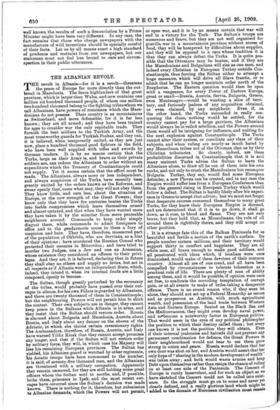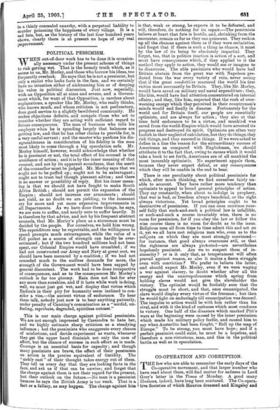THE ALBANIAN REVOLT. T HE revolt in Albania—for it is a
revolt—threatens the peace of Europe far more directly than the out- break in Macedonia. The fierce highlanders of that great province, which is larger than Wales, and now contains one million six hundred thousand people, of whom one million two hundred thousand belong to the fighting tribes whom we call Albanians, have powers of resistance which the Mace- donians do not possess. Their country is as mountainous as Switzerland, and more defensible, for it is far less known ; they are all armed ; and they have been trained for ages to consider war the only reputable trade. They furnish the best soldiers to the Turkish Army, and the most trustworthy guards for Turkish Pashas, and they can, it is believed, when temporarily united, as they are just now, place a hundred thousand good fighters in the field, who have been well supplied with rifles and swords by German traders. It is by no means certain that the Turks, large as their Army is, and brave as their private soldiers are, can reduce the Albanians to order without an expenditure which the Treasury of Constantinople could not supply. Yet it seems certain that the effort must be made. The Albanians, always more or less independent, and always suspicious of the Turks, have recently been greatly excited by the orders known as the Reforms, and swear openly that, come what may, they will not obey them. They know little, and care less, about the situation of Europe, or the new strength of the Great Powers ; they know only that they have for centuries beaten the Turks into feeble compromises which leave themselves armed and almost untaxed, and that when they have wanted more they have taken it by the scimitar from more peaceable neighbours around. Commands to keep order simply disgust them, while commands to admit foreigners to office and to the gendarmerie rouse in them a fury of suspicion and hate. They have, therefore, massacred part of the population of Okhrida, who are Servians, as a hint of their opinions ; have murdered the Russian Consul who protected their enemies in Mitrovitza ; and have tried to murder two Judges, one a Jew and one an Armenian, whose existence they considered. an offence to their privi- leges. And they are, it is believed, declaring that in future they shall obey no others and supply no levies, but act in all respects as if Albania were an independent State, which, indeed, they intend it, when its internal feuds are a little composed, openly to become.
The Sultan, though greatly perturbed by the recusancy of the tribes, would probably have passed over their out- rages in silence, for his own Palace is guarded by Albanians, and there are twenty thousand of them in Constantinople ; but the neighbouring Powers will not permit him to shirk the contest. Their own subjects are in danger, they cannot keep peace in the Balkans while Albania is in arms, and they insist that the Sultan should restore order. Russia is alarmed about Bulgaria and Macedonia, Austria about Bosnia, and Italy about any danger on the shores of the Adriatic, in which she claims certain reversionary rights. The Ambassadors, therefore, of Russia, Austria, and Italy have warned Yildiz Kiosk that they cannot accept promises any longer, and that if the Sultan will not restore order by military force, they will, in which case his Majesty will lose his remaining European provinces. The Sultan has yielded, his Albanian guard is watched by other regiments, his Asiatic troops have been summoned to the number, it is said, of seventy-five thousand men, and the Albanians are threatened with a military occupation. Apparently they remain unmoved, for they are still holding some great officers whom the Sultan sent to soothe, and, if possible, bribe them, prisoners in Ipek, and the most recent out- rages have occurred since the Sultan's decision was made known. There is nothing for it, therefore, but submission to Albanian demands, which the Powers will not permit, or open war, and it is by no means certain that war will end in a victory for the Turk. The Sultan's troops are numerous and brave, but they are not well organised for guerilla war in a mountainous province without stores of food, they will be hampered by difficulties about supplies, and they will be opposed to a race whose tradition it is that they can always defeat the Turks. It is quite pos- sible that the Ottomans may be beaten, and if they are the Macedonians and Bulgarians will rise as one man, and indeed every Christian in European Turkey outside Con- stantinople, thus forcing the Sultan either to attempt a huge massacre, which will drive all Slays frantic, or to admit that he can no longer maintain order north of the Bosphorus. The Eastern question would then be open with a vengeance, for every Power of Eastern Europe, great or small—Russia, Austria, Servia, Bulgaria, Greece, even Montenegro—would be wanting a slice of terri- tory, and furiously jealous of any acquisition obtained, or even claimed, by any neighbour. Even if, on the other hand, the Turks succeeded in really con- quering the clans, nothing would be settled, for the country cannot pay for a large garrison, the Albanians would always be in veiled rebellion, and the Powers around them would all be intriguing for influence, and waiting for the next explosion against Constantinople. The Turks cannot alter their system, or conciliate any class of their subjects, and when ruling are nearly as much hated by any Mussulman tribes not of the Ottoman clan as by their Christian tributaries. So clearly, indeed, are these probabilities discerned in Constantinople that it is said many eminent Turks advise the Sultan to leave the Albanians alone, to draw all he can of them into his own ranks, and not only to crush the Macedonians but reconquer Bulgaria. Turkey, they say, would find some European defender, a new Plevna can be created, and in any case the Empire would suffer less from a European Conference than from the general rising in European Turkey which would follow a defeat. The Sultan is hardly likely after his experi- ence in Greece to accept that advice ; but we must not forget that desperate courses commend themselves to many great Turks, for they know their European Empire is doomed, and are determined that if it is to go down, it shall go down, as it rose, in blood and flame. They are not only bravo, but they hold that, as Mussulmans, the rule of all around them is rightfully theirs, and they will accept lie other position.
It is a strange fate this of the Balkan Peninsula for so beautiful and fertile a section of the earth's surface. Its people number sixteen millions, and their territory would support thirty in comfort and happiness. They are all white men, all brave enough to make good soldiers, and all penetrated with ideas which, if localism were once diminished, would make of them devotees of their common country. Almost all are of one creed, and all have been compelled by circumstances to tolerate toleration as a practical rule of life. There are plenty of men of ability among them, and it would be possible, if opinion were once set free, to eradicate the corroding temptation of corrupt gain, or at all events to make of bribe-taking a dangerous offence. There is no sound reason why, if they were let alone, they should not set up a Federal Monarchy as secure and as prosperous as Austria, with much agricultural wealth, and possession of the land trade between Western Asia and Eastern Europe. Seated on the Black Sea and the Mediterranean, they might even develop naval power, and sebecome a noteworthy factor in European politics. That would seem in the eyes of any political philosopher the position to which their destiny called them ; but every one knows it is not the position they will obtain. Even if their internal jealousies and hatreds did not prevent any permanent combination for defence, the Great Powers in their neighbourhood would not bear to see them grow strong in union and peace. Russia would declare that her own door was shut on her, and Austria would assert that her only hope of " sharing in the modern development of wealth" was taken away ; and both would waste armies and heap Debt upon themselves rather than resign the chance of ruling on at least one side of the Peninsula. The Concert of Europe is rarely benevolent, and for such an object as we have sketched. the Concert could not be called into exist- ence. So the struggle must go on to some end never yet clearly defined, and a really glorious land which might be added to the domain of European civilisation must remain in a thinly concealed anarchy, with a perpetual liability to murder poisoning the happiness of every village. It is a sad fate, but, as the history of the last four hundred years shows, clearly there is at present no hope of any real improvement.



























































 Previous page
Previous page